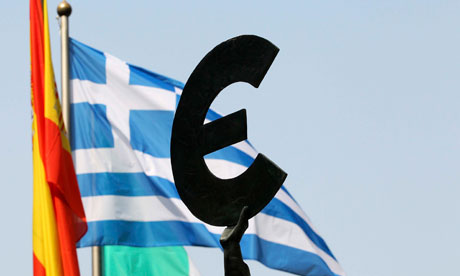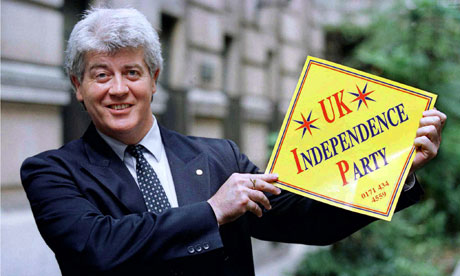
'There was a time when Labour was adamantly anti-EU. Gaitskell, Foot, Kinnock and even Blair opposed it' Photograph: Francois Lenoir/Reuters
The idea of reshaping the world, changing it for the better, is probably a natural, if not a divine one. However, the lure of progress can be deceptive. "Great enterprises" of the kind Charles de Gaulle in his memoirs famously associated with the role of France in the world, come regularly unstuck. The latest grand projet of the French rational mind, the EU, is now coming apart at the seams. Rather like the 18th-century "enlightened despotisms" inspired by the French philosophes, our contemporary bureaucratic autocracy now faces revolution. The peasants of Greece, Spain, Italy and elsewhere are revolting. Even the French peasants are displaying a worrying restlessness.
Progressivism everywhere has a long history of dreadful mistakes. Just look at Marxism. Today, both China and North Korea testify to its illusions as monuments to failed progressivism. So, however, is the EU. Built on progressive myths ("It has brought peace to Europe"; "it extends democracy"; "it creates prosperity"), it is now in relative economic, demographic and technological decline, lacks accountable or transparent structures of government, and is damning future generations to unemployment and despair. It is run by a self-serving, bureaucratic and political elite, is notoriously corrupt, and is admired only by politicians from the Middle East or Africa who bewail their own lack of unity, or by Americans who see its member nations as the colonies of 1776. Its policies are undemocratic – it has forced unelected, technocratic governments on both Italy and Greece – and do not work. Its single currency has brought penury to half a continent. Its present existential crisis has brought political chaos to Italy, Greece and Spain and threatens the same in France.
 Dr Alan Sked launches the UK Independence party in 1993. Photograph: STR News/Reuters
Dr Alan Sked launches the UK Independence party in 1993. Photograph: STR News/Reuters
Here in Britain David Cameron's "progressive conservatism" is being challenged by Ukip, the party I founded 20 years ago and left in 1997 as it became a magnet for people whose vision of the future is the 1950s – a supposed golden age before the EEC, black people, Muslims and other immigrants, gays, lesbians and other products of the sexual revolution of the 1960s, desecrated this island Eden.
On the left, however, there has been no response to events in Europe. The Labour party seems intellectually paralysed in face of both the economic and political crises in Europe. The Lib Dems remain knee-jerk "good Europeans" with absolutely nothing to say. They are like the officer on the Titanic who, when warned of the iceberg, ordered "full steam ahead". The great Liberal party of Gladstone, Asquith and Lloyd George opposed European empires. Gladstone famously asked where on the map the Habsburgs had ever done any good? But today's Lib Dem pygmies give unquestioned support to our new Habsburg empire ruled from Brussels.
There was a time when Labour was adamantly anti-EU. Gaitskell, Foot, Kinnock and even Blair opposed it. But then Jacques Delors told the TUC that whereas they were impotent to defeat Thatcherism, he could and would overthrow it from Brussels. Almost overnight, Labour's patriotism disappeared and the party stood on its head. Brussels had managed to divide and rule Britain. The Welsh windbag, Kinnock, even became an EU commissioner and made a tax-free fortune doing nothing for the public interest but sacking whistleblowers in the corrupt EU bureaucracy. His must be the most pathetic career in postwar British politics. Blair and Mandelson, of course followed suit (although Blair failed to get an EU presidency) and – amazingly – this whole discredited clique still advocates that Britain join the euro.
An alternative, moderate party of the centre left should seek a new path for Britain. To avoid the trap of deluded, world-historical progressivism, it should remain firmly fixed on these objectives:
1. Direct, transparent, accountable democracy
2. Liberal values that protect the individual from discrimination on grounds of gender, race, sexual orientation, religion or political belief and uphold freedom of speech, freedom of the press and media, freedom of assembly, the right to a fair trial, and freedom from arbitrary arrest
3. A social policy which seeks to provide decent pensions, care, social housing, welfare benefits and full employment to all in need after a sound education that caters to everyone's talents (including those with disabilities).
4. A foreign policy that protects British national interests without thereby threatening those of others. This would involve withdrawing from the EU and negotiating free trade with our European friends and neighbours. Britain would not need to withdraw from Nato or the UN and would continue to seek peace in the Middle East and elsewhere. It would also continue to support the principle of giving overseas aid.
5. Domestically, the most radical changes, apart from ending an austerity aimed mainly at the poor, might be constitutional. It might be wise to federalise the UK and make the House of Lords an elected federal chamber. Perhaps an independent Britain could negotiate a confederation of the British Isles with the Irish Republic to help solve Ireland's problems.
Certainly, an independent Britain should be outward looking. As for the EU, there is no reason to assume automatically that it would survive a British exit. Other member states might prefer to choose democracy and independence. All Europe would be in a democratic flux. But let that democratic revolution start here.


